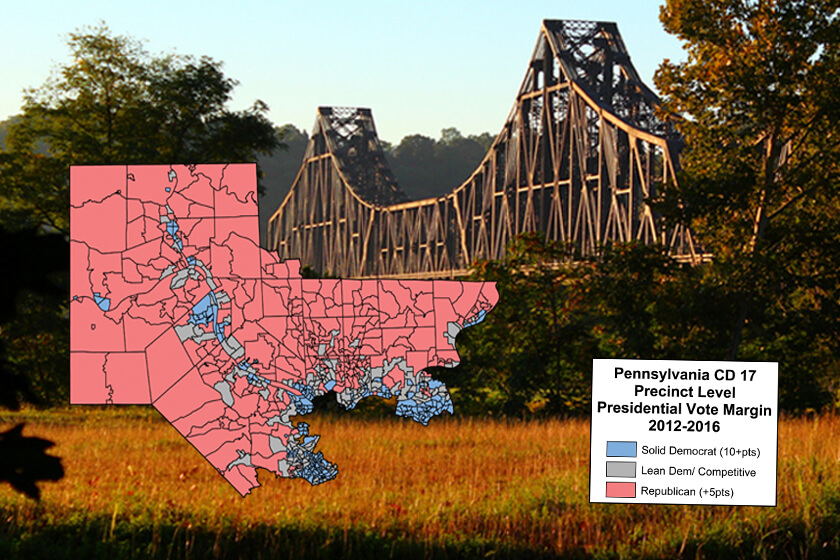West Long Branch, NJ – The Democratic candidate has a sizable advantage in the race for Pennsylvania’s newly drawn 17th Congressional District, the nation’s only House contest that pits two incumbents against each other. The Monmouth University Poll finds that Conor Lamb, who has served in Congress for just three months after winning a special election earlier this year, holds a double digit lead over three-term Republican Keith Rothfus. The Democratic lean of the new district gives Lamb a decided advantage, with many voters expressing doubts about economic policies put forth by both the White House and the GOP-controlled Congress.
Lamb has 51% support and Rothfus has 39% support among all potential voters – that is voters who have participated in an election since 2010 or have newly registered to vote (a group that represents about 88% of all registered voters in the district). Another 9% are undecided. A historical midterm model for likely voters shows the race at 53% for Lamb and 40% for Rothfus, while a model that includes a turnout surge in Democratic precincts gives Lamb a slightly larger 54% to 39% edge. Lamb’s lead is outside the sampling margin of error in all three poll scenarios.
A recent ruling by the Pennsylvania Supreme Court carved the new PA-17 from parts of House districts 3, 12, 14, and 18. Just over half the electorate is currently represented by Rothfus in the old 12th district, but these voters are evenly divided with 46% supporting Lamb and 45% supporting their current congressman. About 1-in-5 voters are represented by Lamb in the current 18th district and they are sticking with him by a 54% to 37% margin. The remainder of the new district is made up largely of Democratic-leaning Pittsburgh suburbs in PA-14 along with a small sliver of heavily Republican PA-03 in Butler County. Taken together, these new voters who are not represented by either of the candidates give Lamb a very sizable lead of 58% to 25% over Rothfus, with a relatively larger undecided vote (15%) compared to the rest of the district.
“Rothfus knocked off a Democratic incumbent in 2012 largely due to a favorably drawn map. It looks like the new court-ordered map could be responsible for his defeat if these poll results hold,” said Patrick Murray, director of the independent Monmouth University Polling Institute.
Overall, Lamb earns better personal ratings (44% favorable and 17% unfavorable) than Rothfus does (31% favorable and 23% unfavorable). Lamb’s ratings are strongest in the section of the district currently in his own PA-18 (54%-17%), but are also positive in the PA-12 (40%-17%) and PA-14/PA-03 (41%-18%) sections. Rothfus is somewhat more popular in the section that includes his current PA-12 (37%-20%) than he is in Lamb’s PA-18 (30%-27%), but his rating is underwater in the new sections drawn from PA-14 and PA-03 (18%-27%).
Donald Trump is not particularly popular in this district, with 44% approving of the president’s job performance and 51% disapproving. Moreover, the number of voters who strongly disapprove (43%) is much larger than those who strongly approve (28%). Over 6-in-10 voters (63%) say it is very important for them to cast a vote for Congress that shows how they feel about the president. Opponents of Trump (73%) are somewhat more likely than his supporters (59%) to feel this way. Trump won the old 12th district by just over 20 points, but only won the newly configured 17th district electorate by about 2 points.
One-third of voters (33%) say Rothfus has given Trump the right amount of support, while 24% say the congressman has been too supportive of the president. Just 8% say he has not been supportive enough and 35% offer no opinion. At the same time, House Democratic leader Nancy Pelosi could also be a drag on the Democratic candidate in PA-17, with 35% saying Lamb has offered her the right amount of support compared with 21% who say he has been too supportive of the minority party leader. Just 8% say he has not been supportive enough and 36% offer no opinion on Lamb’s support of Pelosi.
“Lamb made a point of distancing himself from Pelosi in his razor thin victory last March. It will probably be easier for him to maintain that distance than it will be for Rothfus with Trump,” said Murray.
Opinion on major Trump initiatives in particular could have a negative impact on Rothfus. Nearly half of PA-17 voters (48%) say that the president’s trade and tariff policies will hurt the economy in this part of Pennsylvania. Just 31% say they will help the local economy and only 11% believe these policies will have no impact on the local economy.
Reviews are also mixed for the GOP’s hallmark tax reform plan passed at the end of last year. Overall, 43% approve and 39% disapprove of the new tax reforms, but voters are more likely to believe their own federal tax bill will go up (31%) rather than go down (22%) because of these changes to the tax code. Another 38% expect to see no changes in the federal taxes they pay.
Another factor bolstering Lamb’s prospects is relatively higher enthusiasm among Democratic voters. Overall, 54% of PA-17 voters say they have a lot of interest in the House race, but Democrats (62%) are more likely to report a high level of interest than either Republicans (54%) or independents (43%). District voters are divided on whether they prefer to see the Democrats (41%) or the Republicans (38%) in control of Congress, with 19% saying party control does not matter to them. Democrats, though, have a nearly 14 point voter registration advantage in the newly configured PA-17.
The Monmouth University Poll was conducted by telephone from July 19 to 22, 2018 with 401 voters in Pennsylvania’s 17th Congressional District. The question results in this release have a margin of error of +/- 4.9 percentage points for the full sample and +/- 5.2 percentage points for the likely voter models. The error of the gap between the two candidates’ vote share (i.e. the margin of the “lead”) is +/-6.8 percentage points for the full sample and +/- 7.3 percentage points for the likely voter models. The poll was conducted by the Monmouth University Polling Institute in West Long Branch, NJ.
QUESTIONS AND RESULTS
(* Some columns may not add to 100% due to rounding.)
1/2. If the election for U.S. House of Representatives in your district was today, would you vote for Keith Rothfus the Republican or Conor Lamb the Democrat, or some other candidate? [IF UNDECIDED: If you had to vote for one of the following at this moment, do you lean more toward Keith Rothfus or more toward Conor Lamb?]
[NAMES WERE ROTATED]
| With leaners | July 2018 | ||
| Likely Voter Models | |||
Full voter | Standard | Democratic | |
| Keith Rothfus | 39% | 40% | 39% |
| Conor Lamb | 51% | 53% | 54% |
| Other candidate | 2% | 2% | 2% |
| (VOL) Undecided | 9% | 5% | 5% |
| (n) | (401) | (355) | (355) |
[QUESTIONS 3 & 4 WERE ROTATED]
3. Is your general impression of Keith Rothfus favorable or unfavorable, or do you have no opinion of him?
| July 2018 | |
| Favorable | 31% |
| Unfavorable | 23% |
| No opinion | 46% |
| (n) | (401) |
4. Is your general impression of Conor Lamb favorable or unfavorable, or do you have no opinion of him?
| July 2018 | |
| Favorable | 44% |
| Unfavorable | 17% |
| No opinion | 39% |
| (n) | (401) |
5. How much interest do you have in the upcoming election for House of Representatives – a lot of interest, a little interest, or not much interest at all?
| July 2018 | |
| A lot | 54% |
| A little | 31% |
| Not much at all | 14% |
| (VOL) Don’t Know | 0% |
| (n) | (401) |
6. Have you been following the campaign in your congressional district very closely, somewhat closely, or not too closely?
| July 2018 | |
| Very closely | 15% |
| Somewhat closely | 38% |
| Not too closely | 47% |
| (VOL) Don’t know | 0% |
| (n) | (401) |
7. Do you approve or disapprove of the job Donald Trump is doing as president? [Do you (approve/disapprove) strongly or somewhat?]
| July 2018 | |
| Strongly approve | 28% |
| Somewhat approve | 16% |
| Somewhat disapprove | 8% |
| Strongly disapprove | 43% |
| (VOL) Don’t know | 5% |
| (n) | (401) |
8. On most issues would you say you support or oppose what President Trump is doing?
| July 2018 | |
| Support | 46% |
| Oppose | 49% |
| (VOL) Depends/both | 3% |
| (VOL) Don’t know | 2% |
| (n) | (401) |
9. How important is it for you to cast a vote for Congress that shows your [support of/opposition to] President Trump – very important, somewhat important, not too important, or not at all important?
| July 2018 | |
| Very important | 63% |
| Somewhat important | 19% |
| Not too important | 6% |
| Not at all important | 5% |
| (VOL) Don’t know | 6% |
| (n) | (401) |
[QUESTIONS 10 & 11 WERE ROTATED]
10. Has Keith Rothfus been too supportive of Donald Trump, not supportive enough, or has he given the right amount of support to Trump?
| July 2018 | |
| Too supportive | 24% |
| Not supportive enough | 8% |
| Right amount of support | 33% |
| (VOL) Don’t know | 35% |
| (n) | (401) |
11. Has Conor Lamb been too supportive of Nancy Pelosi, not supportive enough, or has he given the right amount of support to Pelosi?
| July 2018 | |
| Too supportive | 21% |
| Not supportive enough | 8% |
| Right amount of support | 35% |
| (VOL) Don’t know | 36% |
| (n) | (401) |
12. Would you rather see the Republicans or the Democrats in control of Congress, or doesn’t this matter to you?
| July 2018 | |
| Republicans | 38% |
| Democrats | 41% |
| Does not matter | 19% |
| (VOL) Don’t know | 2% |
| (n) | (401) |
13. Do you approve or disapprove of the tax reform plan passed by Congress in December? [Do you (approve/disapprove) strongly or somewhat?]
| July 2018 | |
| Strongly approve | 20% |
| Somewhat approve | 23% |
| Somewhat disapprove | 16% |
| Strongly disapprove | 23% |
| (VOL) Don’t know | 18% |
| (n) | (401) |
14. Under this new tax plan, do you think the federal taxes you pay will go up, go down, or stay about the same?
| July 2018 | |
| Go up | 31% |
| Go down | 22% |
| Stay about the same | 38% |
| (VOL) Don’t know | 8% |
| (n) | (401) |
15. Do you think President Trump’s trade and tariff policies will help, hurt, or have no impact on the economy in this part of Pennsylvania?
| July 2018 | |
| Help | 31% |
| Hurt | 48% |
| Have no impact | 11% |
| (VOL) Don’t know | 10% |
| (n) | (401) |
METHODOLOGY
The Monmouth University Poll was sponsored and conducted by the Monmouth University Polling Institute from July 19 to July 22, 2018 with a random sample of 401 potential voters in Pennsylvania’s 17th Congressional District, drawn from a list of registered voters who voted in at least one of the last four general or primary elections or have registered to vote since January 2016. This includes 205 contacted by a live interviewer on a landline telephone and 196 contacted by a live interviewer on a cell phone. Monmouth is responsible for all aspects of the survey design, data weighting and analysis. Final sample is weighted for region, party registration, age, gender, education and race based on state voter registration list and U.S. Census information. Data collection support provided by Braun Research (field) and L2 (voter sample). For results based on this sample, one can say with 95% confidence that the error attributable to sampling has a maximum margin of plus or minus 4.9 percentage points (unadjusted for sample design). Sampling error can be larger for sub-groups (see table below). In addition to sampling error, one should bear in mind that question wording and practical difficulties in conducting surveys can introduce error or bias into the findings of opinion polls.
| DEMOGRAPHICS (weighted) |
Party Registration |
| 38% Republican |
| 50% Democrat |
| 12% Neither |
Self-Reported Party ID |
| 34% Republican |
| 28% Independent |
| 38% Democrat |
| 48% Male |
| 52% Female |
| 18% 18-34 |
| 22% 35-49 |
| 32% 50-64 |
| 28% 65+ |
| 89% White, non-Hispanic |
| 11% Other |
| 63% No college degree |
| 37% 4-year college degree |
Current House district |
| 56% 12 – Rothfus |
| 21% 18 – Lamb |
| 23% 14 & 03 |
Click on pdf file link below for full methodology and results by key demographic groups.




